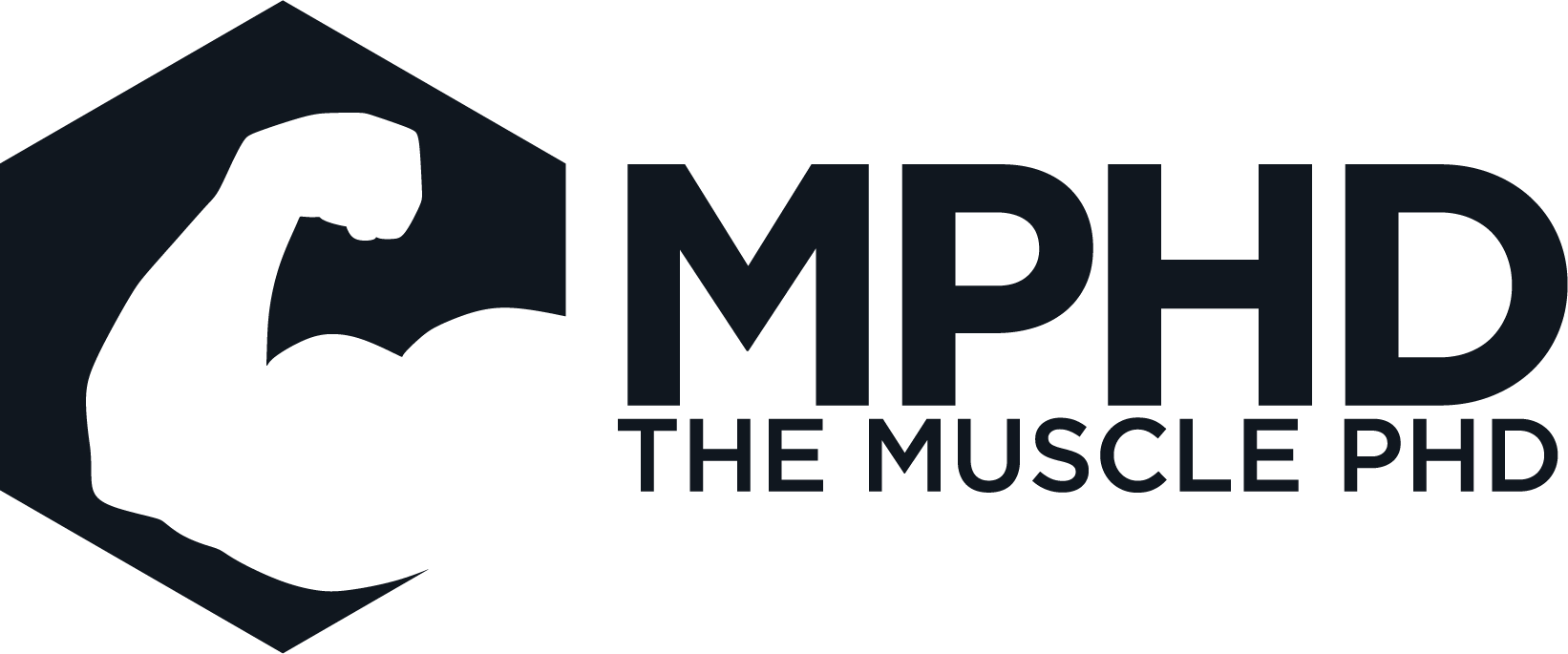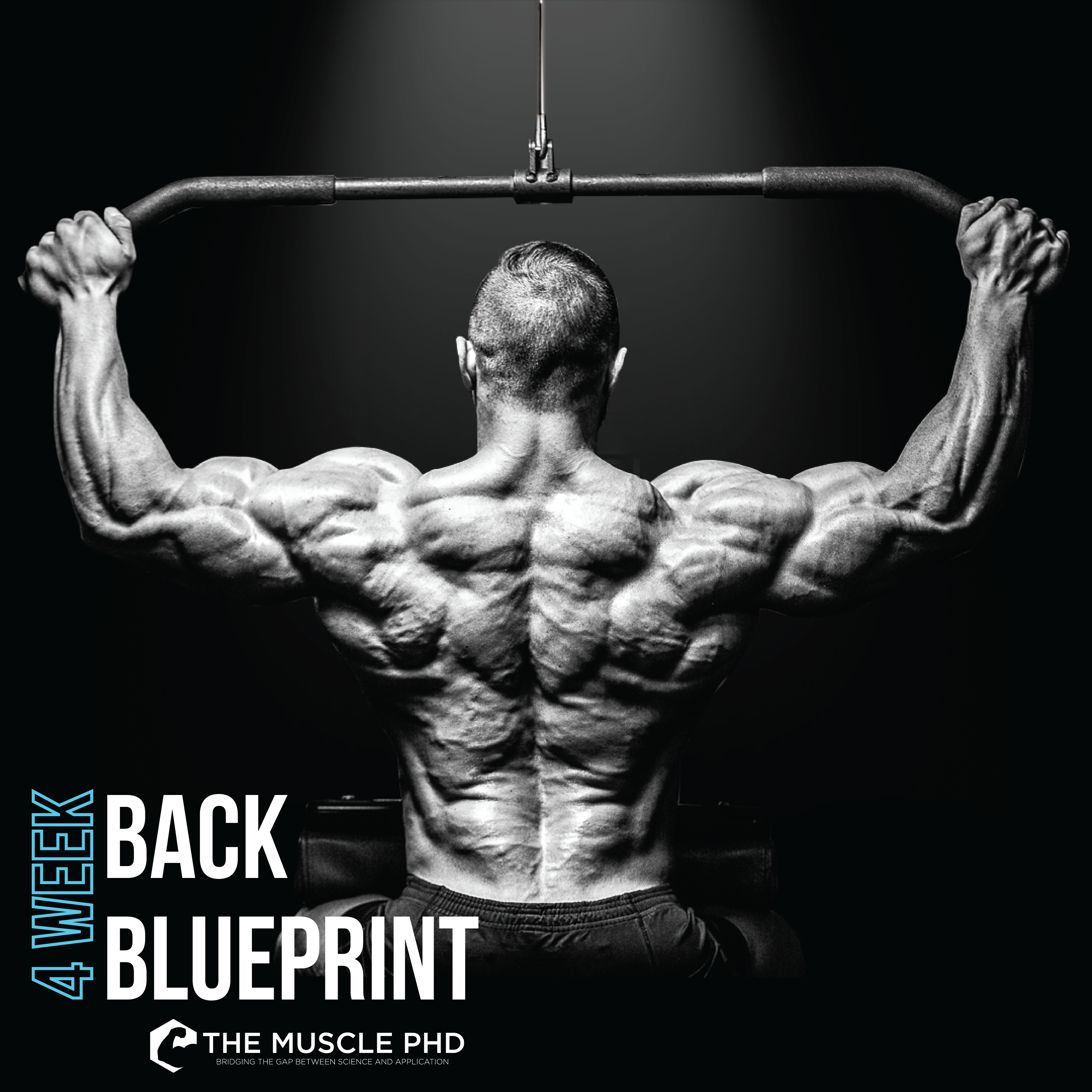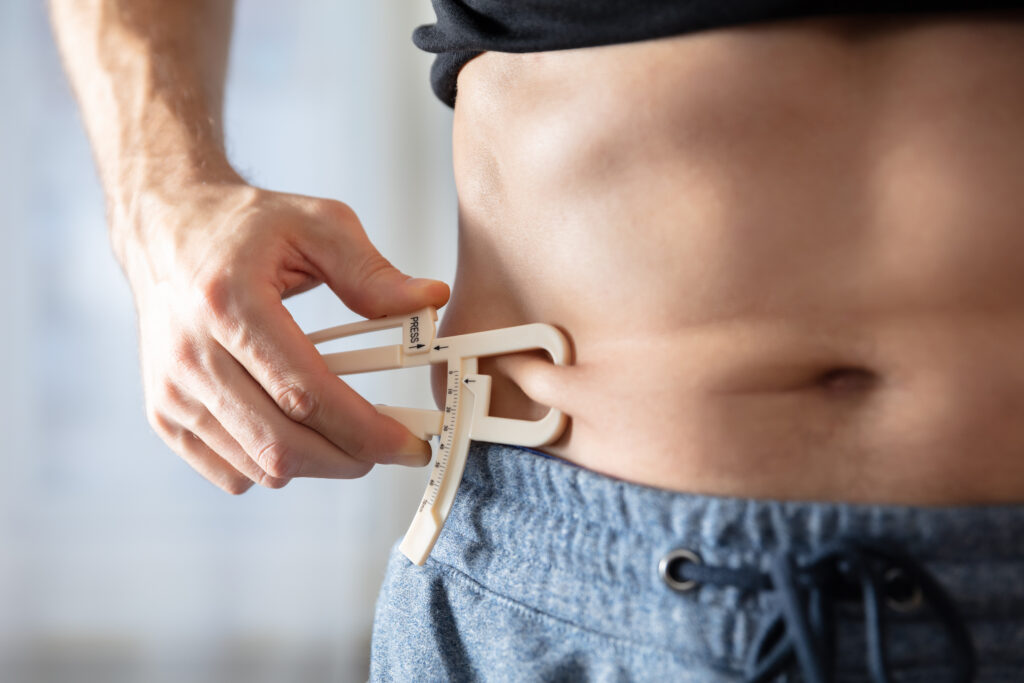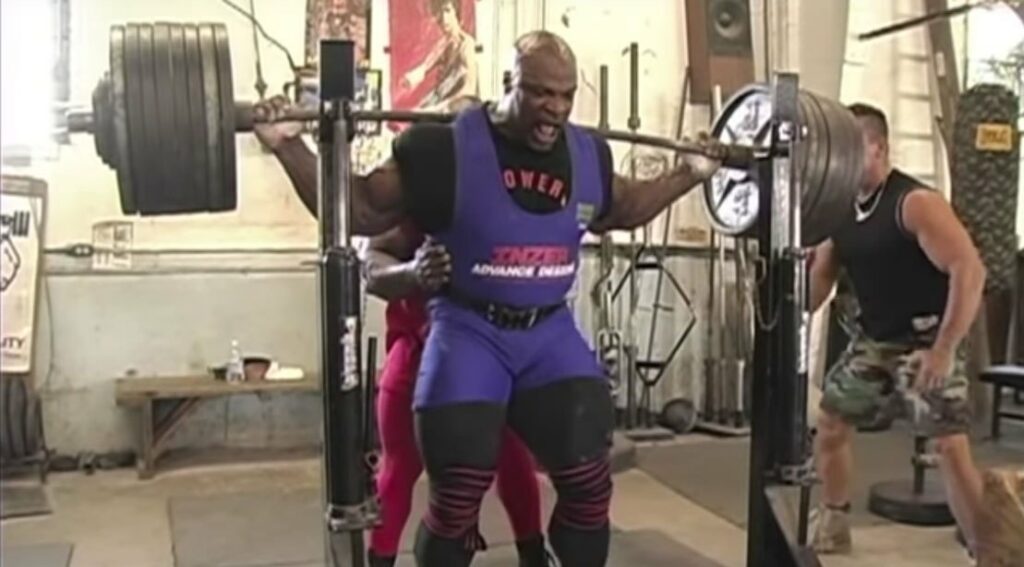Introduction
We recently posed a question on Instagram asking if people thought the current recommendation of eating 1.6g/kg of bodyweight of protein per day was enough to maximize muscle growth. The results were, surprisingly, about split. Many people seemed to think that this level of protein intake was plenty to maximize growth, however, an equally-sized group seemed to think much higher levels of protein were needed to optimize gains. Since the majority of individuals reading these articles are more than likely interested in maximizing growth, let’s go over what the science says about protein and bodybuilders.
Research and Bodybuilders
The first thing worth understanding is that the research into actual bodybuilders is incredibly lacking (18,20). Subject groups are typically convenient populations, like untrained college-aged males, and competitive bodybuilders are not convenient in any way, shape, or form. In addition, many protein recommendations that people like to apply to bodybuilders are designed for athletes. While the discussion about the differences between bodybuilders and athletes is outside the scope of this piece, body composition and performance goals are completely different between the two groups. Therefore, is it a smart practice to apply nutrition recommendations for athletes to bodybuilders?
 The few studies we do have on bodybuilders are more-or-less observational studies (20). How much are these competitors eating? What changes do they make during competitive phases? This type of research is almost more so reporting on current practices in bodybuilding rather than investigating specific variables and using different subject groups, etc. Competitive bodybuilders are highly unlikely to participate in any study in which training or diet is prescribed as part of the study – these people want to be in control of their diet and training, not some skinny scientist. With these shortcomings in mind, what do the current protein recommendations look like?
The few studies we do have on bodybuilders are more-or-less observational studies (20). How much are these competitors eating? What changes do they make during competitive phases? This type of research is almost more so reporting on current practices in bodybuilding rather than investigating specific variables and using different subject groups, etc. Competitive bodybuilders are highly unlikely to participate in any study in which training or diet is prescribed as part of the study – these people want to be in control of their diet and training, not some skinny scientist. With these shortcomings in mind, what do the current protein recommendations look like?
Current Protein Recommendations
Many reviews have come out in recent years stating that optimal protein intake for maximizing muscle hypertrophy is somewhere in the range of 1.4 to 2.0g/kg per day (8,9,15,21,23). However, like we stated in the above section, these recommendations are based off of untrained or slightly trained individuals, or designed for athletes looking to optimize performance rather than aesthetics.
In addition, many of these reviews analyze several intervention studies with seriously poor training programs. A review by Morton et al. (2018) states that 4 studies using just lower body training were included in their review plus 2 examining solely knee extension, 1 using just elbow flexion, and 2 using one lower and one upper body exercise only. This review also consisted of studies using as little as 2/days per week of training with as little as 1 set per day of each exercise (15). Does that sound like bodybuilding-style training to you? Do you think you could infer the maximum protein intake of 1.6g/kg found by Morton et al. (2018) to apply to bodybuilders?
Before we go and trash all of these reviews, it’s 100% worth noting that it is completely necessary to read past the abstract on all of them. Even the Morton et al. (2018) review states that, “Trained individuals… have a higher need for protein supplementation to see increases in lean mass” (15). In addition, the authors claim that, “It may be prudent to recommend ~2.2g/kg for those seeking to maximize resistance training-induced gains in fat-free mass” (15).
On top of the, “between the lines,” secrets offered by Morton et al. (2018), a review by Stokes et al. (2018) offers the recommendation of ingesting between 1.6 and 2.2g/kg of protein per day for optimal gains (21). However, these authors also state that individuals looking to maximize muscle gains may opt for higher protein intakes and cite research by MacNaughton et al. (2016) in which whole body training induced a greater need for protein intake. This study was compared to similar interventions by Witard et al. (2013) and Moore et al. (2008) in which less intense training sessions were used. The authors imply that these findings show a benefit to ingesting greater amounts of protein than current recommendations for individuals undergoing intense training programs with the goal of gaining significant muscle (21).
The most relevant review for bodybuilders and protein intake was penned by Ribeiro et al. in 2019. The authors echo much of the above in stating that the current protein recommendations mostly apply to individuals looking for some gains, rather than maximal gains. Ribeiro et al. (2019) state that 2.2g/kg of protein per day is the minimum amount that bodybuilders should shoot for to create an optimal anabolic environment (18).
Okay, so with all of that being said, what are the real recommendations for bodybuilders and protein intake?
How Much Protein Should Bodybuilders Eat?
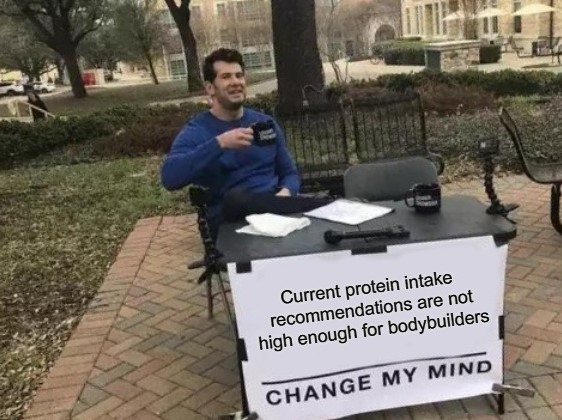 We’ve hinted at this several times already, but most reviews are in agreement that bodybuilders, AKA individuals looking to maximize lean muscle gains, should ingest at least 2.2g/kg of protein per day (7,15,18,21). Unfortunately, this information is often in the fine print of an article rather than boldly displayed in the abstract. Therefore, many trainers and professionals prescribe/recommend lower protein intakes to friends or clients interested in maximizing gains. While a protein intake of 1.6g/kg is probably fine for recreational individuals looking to add some size, upping intake past 2.2g/kg is necessary for maximizing muscle gains.
We’ve hinted at this several times already, but most reviews are in agreement that bodybuilders, AKA individuals looking to maximize lean muscle gains, should ingest at least 2.2g/kg of protein per day (7,15,18,21). Unfortunately, this information is often in the fine print of an article rather than boldly displayed in the abstract. Therefore, many trainers and professionals prescribe/recommend lower protein intakes to friends or clients interested in maximizing gains. While a protein intake of 1.6g/kg is probably fine for recreational individuals looking to add some size, upping intake past 2.2g/kg is necessary for maximizing muscle gains.
During a cut, bodybuilders should shoot for ingesting 2.3-3.1g/kg of protein (7), and can even go up to 4.4g/kg as this has been shown to be an effective method for replacing other macronutrient calories and not causing fat gain (3). This greater protein intake doesn’t always appear to lead to more lean mass gains than ~2.2g/kg (1,2,3) but it does seem to help body re-composition efforts. Which, frankly, most bodybuilders are interested in – gaining muscle and losing fat at the same time.
However, we do see some evidence of greater protein intakes leading to more lean mass gains. One such study found that consuming 2.7g/kg per day was more effective for gains than 2.3g/kg per day (25), however, the 2.7g/kg group achieved their higher protein intake through consuming a protein shake before and after training. This practice has also been shown to be more effective for gains than taking protein shakes at other times during the day (5), so this doesn’t perfectly isolate the greater protein intake as the main variable.
In addition, we also see studies showing huge lean mass gains from a massive bulking diet which included 3.3g/kg of protein per day (17). The best part about this study is that participants didn’t even train! Two things can cause an increase in muscle protein synthesis (which is necessary for growth): food and training (16). Therefore, optimizing both is necessary for maximum gains. The numbers from these studies probably represent some freedom for finding your optimal protein intake. Some people may grow great on 2.2g/kg, but others might have to bump it up a bit to see greater gains.
Benefits of High Protein Diets (Besides Gains)
Before we rattle off the benefits of a high protein diet, we need to assuage the concerns that some seem to have about high protein diets and kidney function. These concerns are based off of findings in individuals with pre-existing conditions – healthy individuals undergoing high protein diets will not have any negative health effects from high protein intake (2).
Now that we have that out of the way, let’s cover some of the other benefits from high protein diets. First, it’s worth keeping in mind that protein is not really, “stored,” in the body like fat or carbohydrate – it is constantly being used or replaced, whether it’s for muscle mass, enzymes, or other functions in the body. Therefore, focusing only on muscle protein synthesis as a measure of protein intake doesn’t cover the full picture – protein has functions in the body outside of maintaining muscle mass (21).
On top of the other functions that protein has in the body, studies show that increasing protein intake can actually help people lose fat – even during periods of calculated caloric surplus (1,2,3). Why is this the case? Increasing protein intake generally leads to a greater overall energy expenditure due to the thermic effect of protein (4). Protein will increase energy expenditure over other macronutrients (6) which makes increasing protein an important component of a diet primed for fat loss.
 In addition, increasing protein intake even over 2.2g/kg can help spare muscle mass during periods of caloric restriction (10,11,13,19,24,27). Maintaining muscle mass is a primary concern of many bodybuilders when undergoing a cut, and protein intakes of 2.3-3.1g/kg are recommended during cuts (7,18,21). This lean mass-sparing effect, in combination with the increased thermic effect from protein, means that carbs and fats should be the main macronutrients that are reduced during a diet – don’t drop protein calories during a diet!
In addition, increasing protein intake even over 2.2g/kg can help spare muscle mass during periods of caloric restriction (10,11,13,19,24,27). Maintaining muscle mass is a primary concern of many bodybuilders when undergoing a cut, and protein intakes of 2.3-3.1g/kg are recommended during cuts (7,18,21). This lean mass-sparing effect, in combination with the increased thermic effect from protein, means that carbs and fats should be the main macronutrients that are reduced during a diet – don’t drop protein calories during a diet!
Conclusion
Ultimately, it’s worth understanding that current protein recommendations are not necessarily applicable to bodybuilders (18). It takes reading past the abstract of a review to find this information, but just about every review has an Easter Egg explaining how bodybuilders will benefit from greater protein intakes than what is recommended in the review for the general public or athletes. It’s just about impossible to replicate bodybuilding-style training and diet in a laboratory setting, so we’ll probably never really get a solid amount of evidence from original research studies with bodybuilding diets/training. Keep in mind that the majority of training studies use untrained subjects who are barely working out – the takeaways from these studies are not at all applicable to bodybuilding and should not be treated as such!
Bodybuilders looking to maximize gains should consume at least 2.2g/kg and up to 3g/kg or more during periods of caloric restriction. During a bulking phase it’s probably fine to stay around the lower end – studies show that competitive bodybuilders typically consume about 2.4g/kg of protein during bulk phases (20) and that seems to be a solid practice. Upping protein intake is necessary to preserve lean mass during a cut and may even add some extra thermic effect benefits to increase overall energy expenditure during a cut.
If you’re interested in maximizing gains and a fitness professional or trainer tries to tell you that 1.6g/kg is plenty of protein, feel free to point them towards this article and encourage them to actually read the scientific literature they’re trying to cite. Scientific writing can be incredibly dry and hard to digest, however, a much greater understanding of the implications of a study or review can be garnered from reading the entire paper rather than just the abstract. Do your homework and remember, more brains equals more gains.
Ultimately, 1.6g/kg of protein is fine for normal people. But, does anyone here just want to be a normal person?
References
- Antonio, J., Ellerbroek, A., Silver, T., Orris, S., Scheiner, M., Gonzalez, A., & Peacock, C. A. (2015). A high protein diet (3.4 g/kg/d) combined with a heavy resistance training program improves body composition in healthy trained men and women–a follow-up investigation. Journal of the International Society of Sports Nutrition, 12(1), 39.
- Antonio, J., Ellerbroek, A., Silver, T., Vargas, L., Tamayo, A., Buehn, R., & Peacock, C. A. (2016). A high protein diet has no harmful effects: A one-year crossover study in resistance-trained males. Journal of Nutrition and Metabolism, 2016.
- Antonio, J., Peacock, C. A., Ellerbroek, A., Fromhoff, B., & Silver, T. (2014). The effects of consuming a high protein diet (4.4 g/kg/d) on body composition in resistance-trained individuals. Journal of the International Society of Sports Nutrition, 11(1), 19.
- Bray, G. A., Redman, L. M., de Jonge, L., Covington, J., Rood, J., Brock, C., … & Smith, S. R. (2015). Effect of protein overfeeding on energy expenditure measured in a metabolic chamber. The American Journal of Clinical Nutrition, 101(3), 496-505.
- Cribb, P. J., & Hayes, A. (2006). Effects of supplement-timing and resistance exercise on skeletal muscle hypertrophy. Medicine & Science in Sports & Exercise, 38(11), 1918-1925.
- Hackney, K. J., Bruenger, A. J., & Lemmer, J. T. (2010). Timing protein intake increases energy expenditure 24 h after resistance training. Medicine and Science in Sports and Exercise, 42(5), 998-1003.
- Helms, E. R., Zinn, C., Rowlands, D. S., & Brown, S. R. (2014). A systematic review of dietary protein during caloric restriction in resistance trained lean athletes: a case for higher intakes. International Journal of Sport Nutrition and Exercise Metabolism, 24(2). 127-138.
- Jäger, R., Kerksick, C. M., Campbell, B. I., Cribb, P. J., Wells, S. D., Skwiat, T. M., … & Smith-Ryan, A. E. (2017). International society of sports nutrition position stand: protein and exercise. Journal of the International Society of Sports Nutrition, 14(1), 20.
- Kerksick, C. M., Wilborn, C. D., Roberts, M. D., Smith-Ryan, A., Kleiner, S. M., Jäger, R., … & Greenwood, M. (2018). ISSN exercise & sports nutrition review update: research & recommendations. Journal of the International Society of Sports Nutrition, 15(1), 38.
- Kim, J. E., O’Connor, L. E., Sands, L. P., Slebodnik, M. B., & Campbell, W. W. (2016). Effects of dietary protein intake on body composition changes after weight loss in older adults: a systematic review and meta-analysis. Nutrition Reviews, 74(3), 210-224.
- Layman, D. K., Evans, E., Baum, J. I., Seyler, J., Erickson, D. J., & Boileau, R. A. (2005). Dietary protein and exercise have additive effects on body composition during weight loss in adult women. The Journal of Nutrition, 135(8), 1903-1910.
- Macnaughton, L. S., Wardle, S. L., Witard, O. C., McGlory, C., Hamilton, D. L., Jeromson, S., … & Tipton, K. D. (2016). The response of muscle protein synthesis following whole‐body resistance exercise is greater following 40 g than 20 g of ingested whey protein. Physiological Reports, 4(15).
- Mettler, S., Mitchell, N., & Tipton, K. D. (2010). Increased protein intake reduces lean body mass loss during weight loss in athletes. Medicine & Science in Sports & Exercise, 42(2), 326-337.
- Moore, D. R., Robinson, M. J., Fry, J. L., Tang, J. E., Glover, E. I., Wilkinson, S. B., … & Phillips, S. M. (2008). Ingested protein dose response of muscle and albumin protein synthesis after resistance exercise in young men. The American Journal of Clinical Nutrition, 89(1), 161-168.
- Morton, R. W., Murphy, K. T., McKellar, S. R., Schoenfeld, B. J., Henselmans, M., Helms, E., … & Phillips, S. M. (2018). A systematic review, meta-analysis and meta-regression of the effect of protein supplementation on resistance training-induced gains in muscle mass and strength in healthy adults. British Journal of Sports Medicine, 52(6), 376-384.
- Nicastro, H., Da Luz, C. R., Chaves, D. F. S., Bechara, L. R. G., Voltarelli, V. A., Rogero, M. M., & Lancha, A. H. (2012). Does branched-chain amino acids supplementation modulate skeletal muscle remodeling through inflammation modulation? Possible mechanisms of action. Journal of Nutrition and Metabolism, 2012.
- Pasquet, P., Brigant, L., Froment, A., Koppert, G. A., Bard, D., de Garine, I., & Apfelbaum, M. (1992). Massive overfeeding and energy balance in men: the Guru Walla model. The American Journal of Clinical Nutrition, 56(3), 483-490.
- Ribeiro, A. S., Nunes, J. P., & Schoenfeld, B. J. (2019). Should Competitive Bodybuilders Ingest More Protein than Current Evidence-Based Recommendations? Sports Medicine, 1-5.
- Soenen, S., Martens, E. A., Hochstenbach-Waelen, A., Lemmens, S. G., & Westerterp-Plantenga, M. S. (2013). Normal protein intake is required for body weight loss and weight maintenance, and elevated protein intake for additional preservation of resting energy expenditure and fat free mass. The Journal of Nutrition, 143(5), 591-596.
- Spendlove, J., Mitchell, L., Gifford, J., Hackett, D., Slater, G., Cobley, S., & O’Connor, H. (2015). Dietary intake of competitive bodybuilders. Sports Medicine, 45(7), 1041-1063.
- Stokes, T., Hector, A., Morton, R., McGlory, C., & Phillips, S. (2018). Recent perspectives regarding the role of dietary protein for the promotion of muscle hypertrophy with resistance exercise training. Nutrients, 10(2), 180.
- Tang, J. E., Perco, J. G., Moore, D. R., Wilkinson, S. B., & Phillips, S. M. (2008). Resistance training alters the response of fed state mixed muscle protein synthesis in young men. American Journal of Physiology-Regulatory, Integrative and Comparative Physiology, 294(1), R172-R178.
- Thomas, D. T., Erdman, K. A., & Burke, L. M. (2016). Position of the Academy of Nutrition and Dietetics, Dietitians of Canada, and the American College of Sports Medicine: nutrition and athletic performance. Journal of the Academy of Nutrition and Dietetics, 116(3), 501-528.
- Westerterp-Plantenga, M. S., Lemmens, S. G., & Westerterp, K. R. (2012). Dietary protein–its role in satiety, energetics, weight loss and health. British Journal of Nutrition, 108(S2), S105-S112.
- Willoughby, D. S., Stout, J. R., & Wilborn, C. D. (2007). Effects of resistance training and protein plus amino acid supplementation on muscle anabolism, mass, and strength. Amino Acids, 32(4), 467-477.
- Witard, O. C., Jackman, S. R., Breen, L., Smith, K., Selby, A., & Tipton, K. D. (2013). Myofibrillar muscle protein synthesis rates subsequent to a meal in response to increasing doses of whey protein at rest and after resistance exercise. The American Journal of Clinical Nutrition, 99(1), 86-95.
- Wycherley, T. P., Moran, L. J., Clifton, P. M., Noakes, M., & Brinkworth, G. D. (2012). Effects of energy-restricted high-protein, low-fat compared with standard-protein, low-fat diets: a meta-analysis of randomized controlled trials. The American Journal of Clinical Nutrition, 96(6), 1281-1298.
From being a mediocre athlete, to professional powerlifter and strength coach, and now to researcher and writer, Charlie combines education and experience in the effort to help Bridge the Gap Between Science and Application. Charlie performs double duty by being the Content Manager for The Muscle PhD as well as the Director of Human Performance at the Applied Science and Performance Institute in Tampa, FL. To appease the nerds, Charlie is a PhD candidate in Human Performance with a master’s degree in Kinesiology and a bachelor’s degree in Exercise Science. For more alphabet soup, Charlie is also a Certified Strength and Conditioning Specialist (CSCS), an ACSM-certified Exercise Physiologist (ACSM-EP), and a USA Weightlifting-certified performance coach (USAW).
